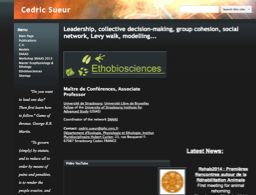Séminaire Complex Networks
Social Networks as a Trade-Off Between Efficient Information Transmission and Reduced Disease Transmission
 Четверг, март 27, 2014
Четверг, март 27, 2014Cédric Sueur (IPHC, Université de Strasbourg)
Network optimality has been described in genes, proteins and human communicative networks. In the latter, optimality leads to the efficient transmission of information with a minimum number of connections. Whilst studies show that differences in centrality exist in animal networks with central individuals having higher fitness; network efficiency has never been studied in animal groups. Living in groups has many advantages but it also involves certain disadvantages such as increased disease transmission and the need to make collective decisions. In theory, the social network properties optimizing decision accuracy and the spreading of information should also increase the disease transmission rate, creating a trade-off between decision-making efficiency and infection risk. We aim to explore this trade-off by examining social network properties and investigating how they might interact to maximize decision accuracy and minimize infection risk.
We studied several groups of primates and found that group size and neocortex ratio were correlated with network efficiency. Centralisation (whether several individuals are central in the group) and modularity (how a group is clustered) had opposing effects on network efficiency, showing that tolerant species have more efficient networks. Such network properties affecting individual fitness could be shaped by natural selection affecting bot information and disease transmission. The main question of interest is how social network properties and individual attributes within this network effect separately and at the same time the diffusion of transmission (tested through opening of a fruit box as a proxy for information and social learning) and of disease (tested through pseudoectoparasites). Two parallel diffusion experiments, tracking the two different flows at the same time through the same individuals, will be carried out on Japanese macaques at the Koshima field site of Kyoto University, Japan. Ultimately, through an innovative experimental approach, this study aims at understanding the relative influence of different factors inherent in social-living, both cultural (innovation) and ecological (infectious disease), on human sociality.
Более подробно …
romain.campigotto (at) nulllip6.fr